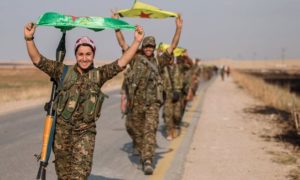by WorldTribune Staff, May 8, 2017
Syria’s Kurds, the fighting force that was key in turning the tide against Islamic State (ISIS), are looking to redraw northern Syria to link their autonomous Rojava region with the Mediterranean Sea.
Kurds make up the majority of the Syria Democratic Forces (SDF) that is closing in on ISIS’s stronghold at Raqqa.

The SDF’s liberation of Raqqa and Deir ez-Zor along the Euphrates would extend territory controlled by the Kurdish autonomous region to almost a third of the country, compared with the current 16 percent, the UK’s Guardian reported on May 6.
Hediya Yousef, who is in charge of the federalism project for the self-declared “democratic federation of north Syria,” said that the population of Raqqa would be given a referendum asking if it wanted the SDF, which includes Arab and Assyrian Christian militia, to form a government following the defeat of ISIS.
“The people in Deir ez-Zor and Raqqa want the SDF to come; in truth the SDF consists of people from these areas,” she said. “Arriving at the Mediterranean Sea is in our project for northern Syria, it’s a legal right for us to reach the Mediterranean.”
“If we arrive at the Mediterranean it will solve many of the problems of the population in northern Syria, everyone will benefit,” Yousef said.
The move, however, is sure to infuriate neighboring Turkey, which has invaded Syria to prevent the Kurds from extending their territory along the Turkish border.
The Mediterranean lies about 100 kilometers from the westernmost edge of Kurdish-held land and the plan would require an agreement with the Syrian regime, although the Kurds and Syrian President Bashar Assad have reached deals on issues such as the airport at Qamishli, which remains under Syrian army control despite being deep inside Kurdish territory.
Any deal would also require Russia’s approval. Russia’s influence in Syria was again highlighted on May 5 when President Vladimir Putin unveiled no-fly zones for Russian, Turkish, Iranian and U.S. militaries in order to protect safe zones for civilians on the ground.
Following recent Turkish airstrikes, hundreds of U.S. forces moved through Rojava to the Turkish border in a show of solidarity with the Kurds that has stoked tensions between Washington and Ankara, the Guardian report said.
Last week, a senior aide to Turkish President Recep Tayyip Erdogan suggested American troops could be targeted alongside their Kurdish allies – a warning that has done nothing to change the Trump administration’s view that the Kurds are an indispensable ally in the battle to liberate Raqqa.
The Observer reported that the SDF is already preparing to stay in control of Raqqa once it is liberated. Kurdish and Arab police officers are being trained in the town of Mabrouka, Syria, specifically to patrol Raqqa after its liberation, the Observer said.
A spokesman for the U.S. State Department said that Syria’s future should be decided by the Syrians themselves, reiterating Washington’s position as not recognizing “any unilaterally declared self-rule semi-autonomous zone.”
An SDF official also revealed it was possible that SDF forces might eventually push west to liberate the city of Idlib, which is currently controlled by a coalition of Islamists and jihadists including the former Al Qaida affiliate Nusra Front.
